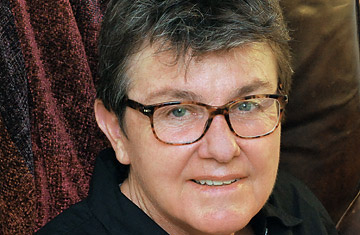
Kay Ryan is named Poet Laureate of the United States.
(2 of 2)
The American poet laureateship grew out of the English medieval tradition of granting royal patronage to poets who traveled from court to court. The first de facto laureate was Ben Jonson, who received a pension from King James I in 1616. John Dryden was the first to bear the official title of "laureate," which was bestowed on him in 1670. He received an honorarium of £100 for writing birthday poems for the royal family. Since then, poets including William Wordsworth and Alfred Lord Tennyson have held the post in England. Their only duty was to write poems for national occasions. Their compensation: some 60 cases of sherry per annum, for inspiration. (In 1999, the U.K. laureateship became a 10-year post with a £5,000 stipend. Andrew Motion is the current beneficiary of both fee and sherry.)
In the U.S., the position existed from 1937 until 1985 under the title Consultant in Poetry to the Library of Congress. Past "consultants" include Robert Frost, Elizabeth Bishop and Robert Lowell. In 1986, Robert Penn Warren was named the first official Poet Laureate Consultant. Although composing poems for state occasions has never been a requirement of the job, Howard Nemerov wrote a poem in 1989 to mark the 200th anniversary of the first meeting of Congress, and Rita Dove composed a poem when the Statue of Freedom was restored to the dome of the Capitol Building in 1993.
So how will Ryan, a self-described "modern hermit," adjust to the post's demands? She expects that 90% of her life will be disrupted. "But I'm ready to be interrupted," she says. "I'm getting tired of myself, tired of inflicting myself on myself. I'm ready to inflict myself on others."
Although she is being touted as an outsider in comparison to more high-profile choices of the past, such as W.S. Merwin and Robert Pinsky, she is in fact a well-established poet. It took 10 years for her to get her poems published in "good literary magazines," she recalls, but she has since won nearly every prestigious poetry award, including a Guggenheim fellowship and the Ruth Lilly Poetry Prize, which carries a $100,000 purse, both in 2004. She has kept herself at a remove from the poetry community and has happily taught remedial English at the College of Marin in Kentfield, Calif., for nearly 30 years.
"It was mainly second-language students and students who lost their way in school," Ryan says. "They wanted something that I could help them get: an understanding of the basic elements of grammar, pronouns, those pesky apostrophes. The goal was to write an effective paragraph that was coherent and well supported. We aspired to the semicolon, but that rarely happened."
Her writing is often compared to that of Emily Dickinson because it illuminates the ordinary, truncates thoughts across short lines and creates spliced, internal rhymes — what she calls recombinant rhyme, as in recombinant DNA.
David Lehman, editor of the Best American Poetry series, describes her work as both "riddling and reader-friendly." And critics often note the wry, introspective, paradoxical quality of her poems. Ryan has said that her poems "surf the edge of sensory deprivation." Yet she also seeks to unnerve the reader.
"Poems bite," she says. "And my poems are bitey."
How Ryan will wield her bite remains to be seen. Each poet laureate can establish programs of his or her own choosing. Joseph Brodsky, laureate from 1991 to 1992, worked to make books of poetry available in supermarkets, airports and hotel rooms. Robert Pinsky used his three-year tenure to start the Favorite Poem Project, in which Americans read and comment on their favorite poems. Billy Collins initiated Poetry 180, a poem a day to be read in American high schools.
Although Ryan hasn't decided what her project will be, she agrees with those who feel that poetry's "uselessness" is precisely what makes it cool. As Matthew Zapruder, a poet and an editor at Wave Press, observes, "The idea that you write poetry your whole life and then suddenly in a very public way have to start thinking about how to make it 'useful' for the nation is pretty terrifying. In a culture like ours, where language has been completely and utterly subordinated to the task of selling people things, how do you create a little freedom? Only in art that isn't designed to sell or convince or sermonize or cajole or urge. Maybe that's poetry, or at least some poetry."
Ryan will commute to the Library of Congress — quite a trek from her home in Fairfax, Calif. Until she takes office this fall, she will try to maintain her normal routine, riding her bicycle in the hills and running — the things, she says, "that keep me sane."
But the stress of becoming America's ambassador of poetry is already keeping her up at night. "I just lie in bed rigidly," she says, "and I think about how I have moved from a condition where the world can humiliate me to one where I can humiliate myself. And let down other poets."
